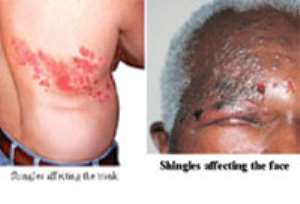
Continued from Friday 9 February, 2007 issue
Another complication is the Ramsay Hunt syndrome. This occurs when the varicella-zoster virus spreads to the facial nerve, causing intense ear pain. The rash can appear on the outer ear, inside the ear canal, on the soft palate (part of the roof of the mouth), around the mouth and on the face, neck and scalp. The hearing loss, vertigo and facial paralysis that may result are usually, but not always, temporary.
Occasionally, the rash will appear as a single spot or cluster of spots on the tip of the nose. This is not good news. It means that the nerve, which supplies the external structures of the eye, is involved and the eye may become affected, possibly causing temporary or permanent blindness.
The pain in shingles is treated with mild analgesics. Stronger analgesics may be used in server cases. The blisters and ulcers formed when the blisters break are treated with antisectic agents and dressed regularly.
The severity and duration of an attack of shingles can be significantly reduced by immediate treatment with antiviral drugs. Antiviral drugs may also help stave off the postherpetic neuralgia.
Other treatments for postherpetic neuralgia include steroids, antidepressants, anticonvulsants, and topical agents.
A person with a shingles rash can pass the virus to someone, usually a child, who has never had chickenpox, but the child will develop chickenpox, not shingles. A person with chickenpox cannot communicate shingles to someone else. Shingles comes from the virus hiding inside the person's body, not from an outside source.
People who have had chickenpox cannot “catch” shingles from someone who has it. However, people who've never had chickenpox can be infected with chickenpox if exposed to someone with an active case of shingles. The rash sheds the varicella-zoster virus and can be contagious.
Also at risk for shingles are people with leukemia, lymphoma, or Hodgkin's disease, and those whose immune systems have been weakened because they are HIV-positive, or have undergone chemotherapy, radiation, transplant surgery with immunosuppression, or treatment with steroids or steroid abuse.




 We’ll no longer tolerate your empty, unwarranted attacks – TUC blasts Prof Adei
We’ll no longer tolerate your empty, unwarranted attacks – TUC blasts Prof Adei
 Bawumia donates GHc200,000 to support Madina fire victims
Bawumia donates GHc200,000 to support Madina fire victims
 IMF to disburse US$360million third tranche to Ghana without creditors MoU
IMF to disburse US$360million third tranche to Ghana without creditors MoU
 Truck owner share insights into train collision incident
Truck owner share insights into train collision incident
 Paramount chief of Bassare Traditional Area passes on
Paramount chief of Bassare Traditional Area passes on
 Two teachers in court over alleged illegal possession of BECE papers
Two teachers in court over alleged illegal possession of BECE papers
 Sunyani: Victim allegedly shot by traditional warriors appeals for justice
Sunyani: Victim allegedly shot by traditional warriors appeals for justice
 Mahama vows to scrap teacher licensure exams, review Free SHS policy
Mahama vows to scrap teacher licensure exams, review Free SHS policy
 Government will replace burnt Madina shops with a new three-story, 120-store fac...
Government will replace burnt Madina shops with a new three-story, 120-store fac...
